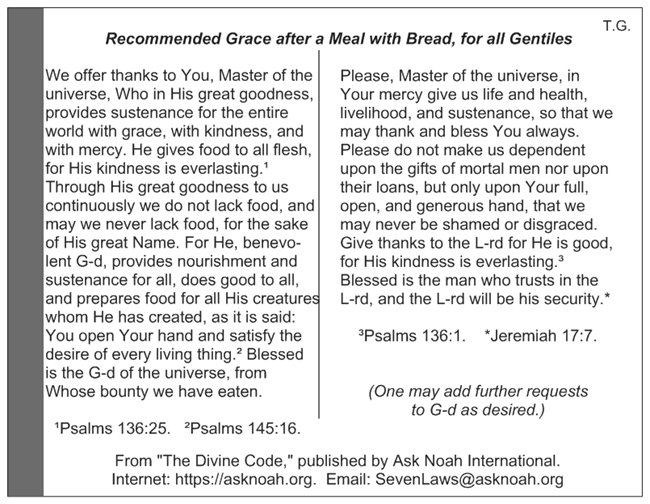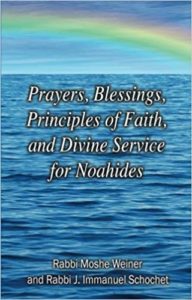
ב''ה
 Subscribe to our
Subscribe to ourAbraham taught guests to bless and thank G-d after eating food to their satisfaction. He did this to teach them that there is only One Creator. We know this from Midrash on the Book of Genesis. Here is the Midrash (quoted as the first lesson in our book The Divine Code):
“[Abraham] planted an eshel in Beer-Sheba, and there he proclaimed the Name of G-d, G-d of the Universe”. (Genesis 21:33) [The Sages discussed this in the following Midrash:]
“[Abraham] planted an eshel in Beer-Sheba” –
[What is this eshel? Reish Lakish said: this teaches that he made an orchard and planted in it many types of fine fruit trees. [He did this to benefit the wayfarers].
[The Sage] Rabbi Nehemiah said: he built an inn [for the wayfarers, for lodging, food and drink].
“and there he proclaimed the Name of G-d, G-d of the Universe” –
[The Sage] Reish Lakish said: Do not read it as “he proclaimed”. Rather, read it as “he caused to call”. This teaches that our forefather Abraham caused the Name of the Holy One, blessed be He, to be called by the mouth of every passerby.
How? After [the wayfarers] ate and drank, they stood up to bless Abraham. He would say to them, “Was it then of my food that you ate? You ate from the food of the G-d of the universe.
[Rather, you should] thank, praise and bless He Who spoke and caused the universe to come into being.”
They would ask, “What shall we say?”
He told them, “Blessed is the G-d of the universe, from Whose bounty we have eaten.”
So Abraham taught all people to recognize and call in the Name of G-d, G-d of the universe.
(From Tractate Sotah 10b and Rashi; Midrash Rabbah Genesis ch. 54)
A longer Grace After Meals for Noahides may be recited instead, after a filling meal. As a prayer of thanks to G-d, the following two paragraphs, arranged by Rabbi Moshe Weiner of Jerusalem, are recommended:

(To order cards with this Grace After Meals, Click Here.)
These short and long forms of Grace after Meals are included in our booklet of prayers and blessings for Noahides:

Rav Moshe Weiner approved the following rules for Noahides (adapted from Shulchan Aruch HaRav 184:3):
Until when may one recite a prayer of Grace After Meals, if one forgot or was delayed, etc.? Until the food in one’s digestive system begins to be digested. How long is that? As long as one is not hungry as a result of that meal. If one ate for his meal all that he desired, then from the time he begins to feel hungry, he may no longer recite the prayer. This applies even though his food has not been fully digested, since the digestive process has already begun.
What if he wanted to eat more, but stopped eating his meal and did not have more to eat? His later desire for more does not indicate that what he has eaten has already begun to be digested. Instead, he may no longer recite the prayer after an hour and a fifth. [That is 72 minutes, from the time he stopped eating.]
A person’s feeling of fullness or hunger is not exact. So if he waited less than 72 minutes after eating a meal and did not yet recite Grace, but he feels hungry, he should eat a small amount. Then he can immediately recite Grace for the meal that he ate. This is to remove doubt, since a person is not proficient in measuring whether he is as hungry as he was before he ate. For were he certain that he’s as hungry as he was before eating, the food has begun to be digested.
What if a person waited after eating a meal and then ate again within 72 minutes to remove a doubt concerning his obligation to recite Grace (as explained above)? He is not required to recite the particular blessing before eating that type of food a second time (a blessing before eating bread, or fruit, or vegetables, etc.), if that type of food was already covered by his blessing(s) before eating the foods in his meal. (Note: the blessing for eating bread at the beginning of a meal covers all the food that the person will eat in that meal.)
What if the food over which the person recited the blessing before eating has definitely begun to digest? The relevance of the first blessing (before eating food in the meal) has already ceased. Therefore he should make another blessing before eating again.
What if one desires to cover two meals with one blessing of Grace (subject to the above rules)? He must again recite a blessing before eating the second meal if the interval between these meals was definitely long enough for digestion to begin. This occurs if he was full after his meal and did not want more, and now he feels hungry.
Rabbi J. Immanuel Schochet o.b.m. and Rabbi Moshe Weiner of Jerusalem taught the following. Noahides are also encouraged to recite thanks to the One True G-d before eating a meal or a snack. Those short words of thanks can mention the type of food or drink before taking the first bite or drink.
For example, a Noahide can recite thanks and blessing to “G-d, King of the universe”:
1) “Who brings forth bread from the earth” (for any bread that is made from grain flour – wheat, barley, rye, oats or spelt – with water as the main liquid)
2) “Who creates various kinds of sustenance” (for non-bread foods made from grain flour, such as crackers, pastas, pastries, etc.)
3) “Who creates the fruit of the vine” (for grape wine and grape juice)
4) “Who creates the fruit of the tree” (for fruits that grow on perennial trees, bushes and vines)
5) “Who creates the fruit of the earth” (for edible roots, leafy greens, all vegetables, legumes, and fruits that don’t grow on trees)
6) “by Whose word all things came to be” (other foods that don’t grow from plants with roots in the ground, such as: meat, beverages, candy, milk, eggs, cheese, mushrooms, etc.)
> A prayer of thanks to G-d for bread at the start of the meal (#1) includes within it everything else that will be eaten within the meal (since bread, which is the “staff of life,” is the most important food), so no mention of thanks for the other foods or beverages within that meal is needed – except for grape wine or grape juice, which has the most important status among beverages.
> Likewise, a prayer of thanks to G-d for drinking grape wine or grape juice (#3) at the start of a snack or a meal includes all the other beverages that will be drunk within that occasion. So in that case, a separate blessing upon drinking any other beverages afterwards is not needed (even if bread in not being eaten).
> Blessing #5 (for a fruit of the earth) will also include #4 (for a fruit), if #4 is not said first. Blessing #6 (for all edible things) will also include any of the others that are not said before it.
Explanation:
When a person is about to eat a snack with different kinds of food (without eating bread), he should proceed in the order of the list above. That is because a person logically should say more praises to G-d if he has the opportunity to do so. Therefore it is meritorious if he blesses and partakes of a tree-fruit (#4) before blessing and partaking of a vegetable (#5), and says the general blessing (#6) last (for example, before partaking of meat or cheese).
In that way, he will not prematurely exempt a food that he could have said a blessing for, and so that he doesn’t say any blessings in vain, G-d forbid (for example, if he make an unnecessary blessing for a fruit after he already said a blessing for a vegetable, when both of those are going to be eaten in one snack).
> These blessing for eating or drinking are in the category which the Rabbinical Sages called “blessings for personal benefits.” A person should bless and thank G-d for the benefits which He bestows upon him. The greater the benefit, the greater the person’s feelings of thankfulness will be. This has a practical relevance when choosing what species of fruit (for example) to say the blessing on when several different fruits will be eaten. The person should say the blessing upon the fruit that he likes best, and partake of it first, thereby mentally including all the other fruits that he will eat in that snack.
> There were blessings instituted for Jews to remind them about the spiritual greatness of their Land of Israel. One relates to blessing #4, for fruits. In Deut. 8:8, G-d praises the Land of Israel as “a land of …[grape] vines and figs and pomegranates, a land of oil-olives and [date-]honey.” (In Torah, dates are often referred to as “honey” because of their thick juice.) The Sages instituted that if a Jew has any or all of those five species of fruit before him, the one he should say a blessing for and partake of first (thereby including any other fruits) is one that comes earliest in that verse.
Example: For a fruit salad that includes grapes, one would reciting the blessing #4 and eat a grape first, to include all the other fruits in the blessing. It is permitted (but optional) for Noahides to also follow this rule.
> Before smelling sweet spices (such as cloves or cinnamon), you can thank and bless “G-d, King of the universe, Who creates various kinds of spices.”
> On hearing news that is good both for yourself and for others, you can thank and bless “G-d, King of the universe, Who is good and does good.”
These and other details about reciting blessings to G-d before eating or drinking, and after having a meal, are included in our prayer booklet for Noahides that is pictured above.